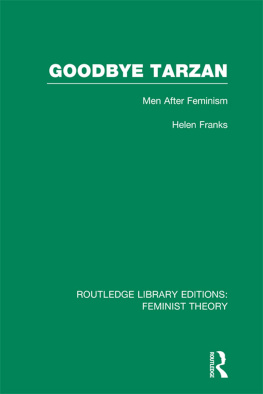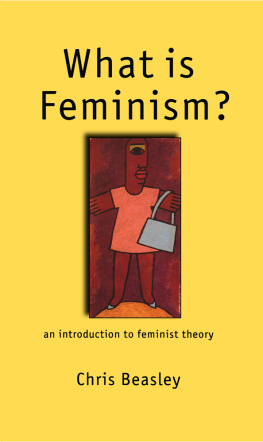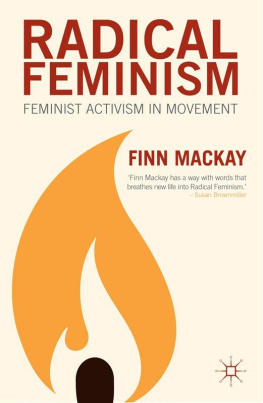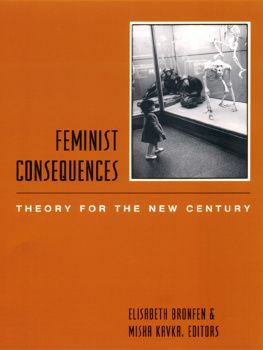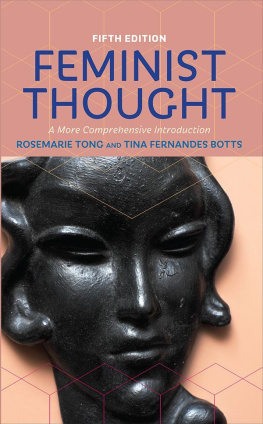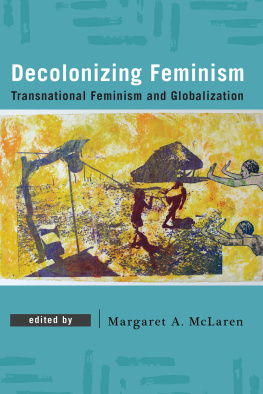ROUTLEDGE LIBRARY EDITIONS:
FEMINIST THEORY
GOODBYE TARZAN
GOODBYE TARZAN
Men After Feminism
HELEN FRANKS
Volume 17
First published in 1984
This edition first published in 2013
by Routledge
2 Park Square, Milton Park, Abingdon, Oxon, OX14 4RN
Simultaneously published in the USA and Canada
by Routledge
711 Third Avenue, New York, NY 10017
Routledge is an imprint of the Taylor & Francis Group, an informa business
1984 Helen Franks
All rights reserved. No part of this book may be reprinted or reproduced or utilised in any form or by any electronic, mechanical, or other means, now known or hereafter invented, including photocopying and recording, or in any information storage or retrieval system, without permission in writing from the publishers.
Trademark notice: Product or corporate names may be trademarks or registered trademarks, and are used only for identification and explanation without intent to infringe.
British Library Cataloguing in Publication Data
A catalogue record for this book is available from the British Library
ISBN: 978-0-415-53401-7 (Set)
eISBN: 978-0-203-08796-1 (Set)
ISBN: 978-0-415-63708-4 (Volume 17)
eISBN: 978-0-203-08480-9 (Volume 17)
Publisher's Note
The publisher has gone to great lengths to ensure the quality of this reprint but points out that some imperfections in the original copies may be apparent.
Disclaimer
The publisher has made every effort to trace copyright holders and would welcome correspondence from those they have been unable to trace.
Goodbye Tarzan
Men After Feminism
Goodbye Tarzan
Men After Feminism
Helen Franks
GEORGE ALLEN AND UNWIN
LondonSydney
Copyright Helen Franks 1984
First published by George Allen and Unwin in 1984.
This book is copyright under the Berne Convention.
No reproduction without permission. All rights reserved.
First published in Great Britain by George Allen & Unwin 1984.
George Allen & Unwin (Publishers) Ltd
40 Museum Street, London WC1A1LU, UK.
George Allen & Unwin (Publishers) Ltd
Park Lane, Hemel Hempstead, Herts HP2 4TE, UK.
George Allen & Unwin Australia Pty Ltd
8 Napier Street, North Sydney, NSW 2060, Australia.
British Library Cataloguing in Publication Data
Franks, Helen
Goodbye Tarzan.
1. Men 2. Sex role
1. Title
305.3'1 HQ1090
ISBN 0-04-305001-8
Set in 10 on 11 point Plantin by Fotographics (Bedford) Ltd
Printed in Great Britain by
Richard Clay (The Chaucer Press) Ltd,
Bungay, Suffolk
Contents
Acknowledgements
So many people and organisations have been helpful with this book. First I must thank the interviewees. They were all interested, and willing to give their time and attention and thoughts to me. I am deeply grateful to them all. Other individuals and organisations who offered suggestions, contacts, and practical help, are: Jimmy Algie, Australian Information Service, Margaret Blumen, British Sociological Association, Firth Brown of Sheffield, Dymphna Byrne, Tom Donovan, Michael Dover, Equal Opportunities Commission, Denise Fuge, Gene Guberman, Hampstead Comprehensive School, Milda Hedblom, Elisabeth Henderson, Stephen Hill, Annie Hopley, Manpower Services Commission, Lorna McKee, David Morgan, Francis Pinter, Quinton Kynaston School, Keith Sylvester, Taylor Nelson Associates, Ray Tobias, Di Trembath.
And finally some special thank yous: To my editor, Adam Sisman, for being such a post-Tarzan man; to my agent, Gill Coleridge, for her enthusiasm far beyond the call of duty; to Dee Knapp for an invaluable stream of information; and to Julian Gloag for arguing and caring.
Foreword
I have used the word feminist interchangeably with the women's movement throughout this book. The expression women's lib was dreamt up by the Press and is never used by feminists to describe themselves, though to many others it is the most familiar term, with its associations of bra-burning and shrewishness. Sometimes it was necessary to use the expression during interviewing, simply because it meant more to the people concerned.
The seventy men I interviewed for this book were selected to give a spread of ages, occupations and attitudes towards the women's movement. I travelled all over England, but found that regional differences meant less on the whole than differences in class and occupation. I have not used real names, since I felt that this would encourage interviewees to speak more freely. There are a few exceptional cases where names are given in full.
Introduction
Men today are finding themselves in some tricky and unexpected situations. At work they might see the traditional pin-ups jostling for space on the wall with some undressed male equivalents, put there in retaliation by women colleagues who wish to make a point about men ogling naked female bodies. They might find themselves having to make the coffee because the one woman in the office says everyone has a turn now. They might switch on the television and see all-women chat shows or all-women theatre or open their newspapers and read that their left-wing local authority has appointed a women's committee which is busy doling out money for day nurseries. They may find that they have to rely on a woman as sole breadwinner or as the main breadwinner -thus demonstrating that it is not, any longer, a man's world.
How do men feel about such developments? How, if at all, are they adjusting to erosions of male supremacy and male power?
I spoke to seventy men aged nineteen to fifty-nine, living in different parts of Britain (and a number living in New York) to try and answer these questions. There were workers in industry, agriculture, academia, the social services, the law, small businessmen, others in large organisations, those who work for other men or for women, men who work for themselves. And since these descriptions identify men by what they do, I must add that more than anything else I wanted to know who they were and how they saw themselves at home, at work, as fathers, lovers, friends, colleagues. I also went into schools to speak to groups of adolescent boys, and interviewed individually several aged between fifteen and eighteen including some who had been brought up in households with deeply committed feminist mothers.
I did not generally interview men I knew well, but chose instead to go to outside sources to get a random group. I explained to interviewees beforehand that my book was about the impact of the women's movement on their lives.
I make no claim that my sample is scientifically pure or the interviews rigorously consistent in style or content. I encouraged people to talk about the aspects that concerned them most. But it occurred to me early on that my impact on these men as a woman, a feminist and a writer was the very stuff of this book. I, for my interviewees, was an example of the impact of the women's movement on men's lives in Britain today.
It was quite easy to find prospective interviewees, indeed I had to turn people away! Out of all the men approached, only three turned me down. One, with an interesting story to tell about his marriage, was in the throes of a divorce and said he would speak to me when it was all over, which was too long for me to wait; another was a confused young man who had given up his career in law and was contemplating a journey round the world for reasons he couldn't articulate. The third is the most interesting. Married to a feminist, himself a trade unionist with professed feminist sympathies, he declined via his wife. Why? I asked her. Too scared, of course, she said. Men who know about feminism


